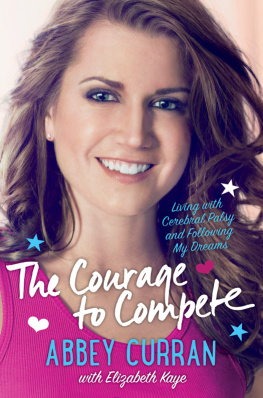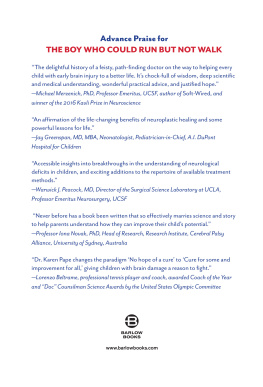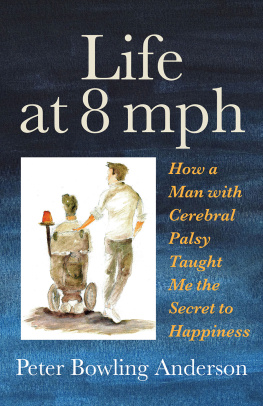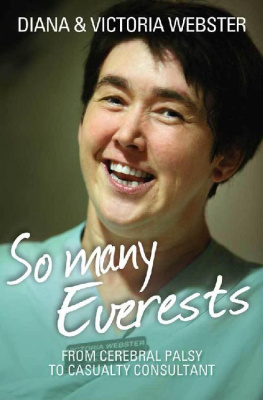SOMEONE LIKE ME
An Unlikely Story
of Challenge and Triumph
over Cerebral Palsy
John W. Quinn
Copyright 2010 by John W. Quinn
All rights reserved.
No part of this publication may be reproduced,
stored in a retrieval system, or transmitted in any form
or by any meanselectronic, mechanical, photocopying,
recording, or otherwisewithout prior written consent
from the History Publishing Company.
Published in the United States by
History Publishing Company
Palisades, New York
LCCN: 2010921778
ISBN-10: 1-933909-74-9
ISBN-13: 978-1-933909-74-5
SAN: 850-5942
Quinn, John W., 1962
Someone like me : an unlikely story of challenge and triumph over cerebral palsy / John W. Quinn.
p. cm.
Includes index.
LCCN 2010921778
ISBN-13: 9781933909080
ISBN-10: 1933909749
1. Quinn, John W., 1962- 2. Cerebral palsied--Biography. 3. United States. Navy--Officers--Biography. 4. Cerebral palsy--Biography. I. Title.
RC388.Q56 2010 362.1968360092
QBI10-600039
Printed in the United States on acid-free paper
9 8 7 6 5 4 3 2 1
First Edition
To Phil Freeman
For always putting the needs of others before
your ownIm placing you first.
Some succeed because they are destined to, but most succeed because they are determined to.
Henry Van Dyke,
American author, educator, and clergyman
CONTENTS
This book is written entirely from my own personal memory of places, events, people, and conversations. Although not word-for-word reenactments, this is every bit my story and not a work of fiction. Others may have a different slant on events, but these are mine. Several names of individuals have been changed in order to respect their privacy, but thats about it.
Introduction
I enjoy reading biographies and inspirational non-fiction. Looking for a book written by and about a disabled adult, I combed my local bookstore and library recently but found only two that came close to what I had in mind: My Left Foot by Christy Brown, and Ten Things I Learned from Bill Porter by Shelly Brady. I was disappointed by the lack of memoirs currently on the market written by adults coping with any disability, much less one specific to my conditioncerebral palsy.
Cerebral palsy is a handicap that currently affects over 750,000 people in the United States alone; most published material is primarily focused on infants and parenthood, e.g., Your baby has cerebral palsy, now what?
I found numerous medical journals describing the various types and causes of CP, and countless manuals explaining rights to possible legal action, but neither was what I wanted and needed.
I wrote Someone Like Me: An Unlikely Story of Challenge and Triumph over Cerebral Palsy to fill that void. I wanted to tell what its like to have cerebral palsy as an adult. It is commonly known that the majority of people with CP go through years of physical therapy in their youth and typically, they suffer humiliation from being laughed at by schoolmates because of a limp or tremor. But it is generally not known what it is like to be an adult, facing such issues as getting and holding down a job, dating, and finding some measure of self worth. Some CP sufferers have symptoms much worse than I.
My sincere wish is that by sharing my story they may find some comforting commonality and be glad their voices are heard within these pages.
My story tells about the secret life I led. I now know that my family is not the only one to request that their childs condition be kept a secret because of the shame it would bring them. I know about secrets. I hid the fact of my cerebral palsy from Navy officials for twenty years. It feels good to finally tell the truth.
Although the book is filled with naval anecdotes and humor, this is not a military book. Nor is it only for the disabled reader. It is an inspirational memoir, full of nostalgic and quirky stories and dialogue garnered from life in a large Catholic family during the 1970s and 80s. My recollections of those years were enhanced by many interesting family discussions during the time spent working on this book, picking everyones memory, going through thousands of photos, and reading through all the letters I wrote to my best friend Phil during my time at sea.
Someone Like Me wasnt easy to write. It was particularly difficult to retrace the times of my life that Id rather forget. Some memories are still quite painful to re-live and others quite embarrassing. Additionally, I had never written anything for publication before. I didnt even know where to put the commas or the quotation marks when I began. Factor in the physical hardships someone with CP facessitting in a chair for hours with legs that tell me if I am going to write today or not, eyes that do not handle computer strain well, and my left-handed keyboard approachthen you begin to understand the challenges I faced.
I would like to acknowledge some of the people who were instrumental in helping me write this book. First of all, thanks to Don Bracken and everyone at History Publishing for believing in my story. My parents, Ed and Shirley, instilled in me the foundation for my success. I felt their love and support with every word I wrote. My sister, Susan, answered my countless e-mails and exhibited endless patience in helping me craft a well-built sentence. You do like words and it shows, Sis. My best friend, Phil, for never throwing anything away, including our friendship. Thanks for sending me those letters, pal. I also want to thank Pam and Barb for their wonderful editing advice, my hard-working agent, Claire Gerus, publicist Lynn Wiese-Sneyd, and the many friends who read draft after draft. To the dedicated men and women of the United States Armed Servicesthanks for standing the watch.
And most of all, thanks to my readers for letting me share the truth.
1
Dont Send Me Home
Oh, no! I groaned, hearing the military doctor give an order I knew I could not follow.
One last exercise before you all become property of Uncle Sam. Everybody, get ready to do the duck walk! he had barked. My mind raced as my pulse quickened. What the hell was a duck walk?
I was moments away from completing my military entrance examination. All that was left was one last stupid-sounding thing and my dream of joining the Navy would be fulfilled.
I had been stuck in downtown Detroit, getting my physical, since eight that morning. Blood had been drawn, eyes and ears checked. Id peed into a cup, turned my head and coughed. Everything had gone smoothly.
It was now four in the afternoon and exhaustion had settled deeply into every muscle and bone in my body. Lets just finish this up and get me sworn into the Navy. Then, I can go home and share the news with my family. My mom was planning to make one of my favorite meals to celebrate: meatballs and gravy.
Just one last exercise.
Let me show you how to do the duck walk, the doctor told us. And I want it done in precisely this manner. No cheating allowed.
His keys jingled in his pocket while he hitched up his pant legs and crouched down on the ground, his white lab coat puddling around his feet. He resembled a major league catcher with his stony expression and arms out in front.
I want you all to stay in this crouch and hold it until we have a chance to come around and take a look. Then I want you to walk, while remaining in the squat position with your arms straight out. Youll look like a duck out of water.
The physician demonstrated how to execute what he wanted done. A few guys quacked. My heart sank, followed quickly by my stomach.







